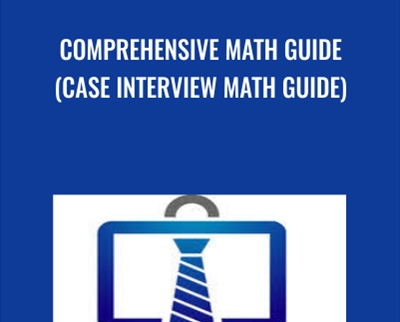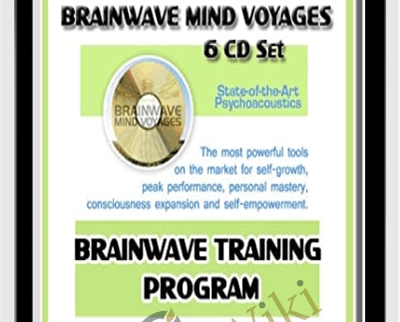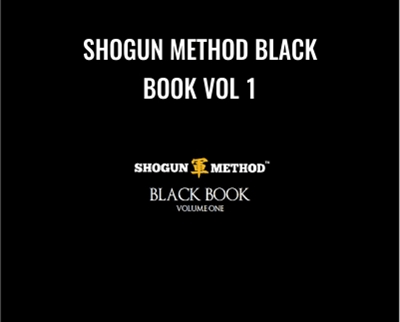Comprehensive Math Guide (Case Interview Math Guide) – Victor Cheng
$13.00
Comprehensive Math Guide (Case Interview Math Guide) – Victor Cheng Download. Your interviewer will know within two to five minutes whether you will pass t…
Salepage link: At HERE. Archive: https://archive.is/wip/oT9zM
Recently I sat down for a roundtable discussion with three other experienced interviewers to chat about what the case interview looks like from the interviewer’s side of the table and to share some secrets that interviewers wish candidates knew. Among the pet peeves and stories of memorable interviews (the great and the not-so-great), we all agreed on one critical fact during the discussion:
Your interviewer will know within two to five minutes whether you will pass the case interview.
Two to five minutes. That’s all it takes. The interviewer spends the next 30-40 minutes watching the process play out.
One of the main indicators to the interviewer that a candidate is NOT going to pass is the calculations they perform and why.
The case interview is NOT a computational test. It is a thinking test that happens to involve computations. So the first decision to make (with regards to when to perform a calculation during an interview) is: Do you actually have to compute anything at all? How do you make that decision about whether or not to make a computation?
Knowing when or when not to perform a calculation is only the first part of how to master the math portion of your case interview. There are many other strategies and techniques to learn and understand in order to successfully pass the case interview.
This is an important skill when it comes to doing math well during a case interview.
Business Concepts, Mathematical Formulas, and How to Interpret Them
The level of math required in a case interview is not computationally complicated. It consists of arithmetic that 11-year-old children typically know and often have mastered. It involves addition, subtraction, multiplication, and division. In consulting and case interviews, we do use percentages a fair amount to do comparisons and to represent parts of a whole (we say our client has 50% market share, or 50% of aggregate sales generated by all competitors in the market, as opposed to 1/2 market share). We would also say that our client’s sales grew by 10% over the past year.
The math itself is not that complicated. What gets tricky for people with no business background is how the math is intertwined with commonly-used business concepts. I’ve found the candidates without business backgrounds (e.g., science, engineering) can easily do the arithmetic required in a case, but don’t really grasp the relevance of their computations.
For example, when they calculate market share for a client (the share of total industry sales that the client generated), and the answer is 35% market share — they get the number correct, but don’t know if 35% is good or bad or something else.
In other situations, such candidates get confused around terminology. For example, what is the difference between sales and revenue? (Answer: There is no difference. It means the same thing.) But “profit” means something entirely different. Sometimes clients (and interviewers) will say the goal is to “grow the business.” You must clarify: do you mean grow sales, or profits?
What makes it even more confusing is that the terminology will vary by country and industry. For example, in some countries instead of saying sales or revenue, they will use the term “turnover.” In the car insurance industry, the money they collect from you and me is not called revenue. It’s called “premiums.” (That’s because in the insurance industry, their “sales” come from policies (which is known as premiums), and from investing the money you and I pay them before we have a car accident and have a claim (which is known as returns from investments).
It is okay if you not familiar with country-specific or industry-specific terminology. It’s okay to ask for clarification of these terms. However, these terms are often routinely defined with general business terminology (as taught in U.S.-based MBA programs). So if you get a case interview on auto insurance and the interviewer uses the term “premiums,” it’s okay to ask what that means. The answer you get will be “revenues from policy holders.” Of course if you don’t know what revenue means, then you’re out of luck.
You do NOT need an MBA to Pass a Case Interview
What you do need to know are the basic math concepts used in business (and their mathematical expressions). This does not take a two-year MBA to learn. It takes about 2 – 3 hours to grasp the business concepts used in 80% – 90% of case interviews. When you know the basics, you will be on equal footing with a Harvard MBA 80% – 90% of the time.
The Comprehensive Guide to Case Interview Math
In my Comprehensive Guide to Case Interview Math, I identify and explain in simple terminology the most frequently-used business concepts (and the math behind them) in case interviews. In addition, I cover:
- Delving deeper into the topic of when it’s appropriate to do a computation in a case interview
- How to actually DO these computations without error
- Frequently occurring calculations used in case interviews that you can practice in advance
- Common business finance and statistical terminology that will help you understand what is actually being asked
Comprehensive Guide to Case Interview Math Contents
- Video: 2.5+ hours of Instruction
- Transcripts of the Videos
- Presentation Slides
- Business Formulas Variations “Cheat Sheet” Handout *
* The business formulas variations “cheat sheet” handout covers the most commonly used business formulas and ratios. It also identifies the various ways these formulas are used or expressed. The underlying math is typically similar or identical, but may initially appear different. The handout points out these variations. In addition, some business terms are used interchangeably and you should be familiar with them also. The handout identifies these as well.
Practical Details
- The investment for this program is $47.
- The program is delivered digitally, and you will receive download instructions within 15 minutes of purchase.
- We use industry standard Adobe Acrobat pdf files and audio file formats that can be used across all major computing platforms.
Here's an overview of the prominent keywords and a list of famous authors:
Business and Sales: Explore business strategies, sales skills, entrepreneurship, and brand-building from authors like Joe Wicks, Jillian Michaels, and Tony Horton.
Sports and Fitness: Enhance athleticism, improve health and fitness with guidance from experts like Shaun T, Kayla Itsines, and Yoga with Adriene.
Personal Development: Develop communication skills, time management, creative thinking, and enhance self-awareness from authors like Gretchen Rubin, Simon Sinek, and Marie Kondo.
Technology and Coding: Learn about artificial intelligence, data analytics, programming, and blockchain technology from thought leaders like Neil deGrasse Tyson, Amy Cuddy, and Malcolm Gladwell.
Lifestyle and Wellness: Discover courses on holistic health, yoga, and healthy living from authors like Elizabeth Gilbert, Bill Nye, and Tracy Anderson.
Art and Creativity: Explore the world of art, creativity, and painting with guidance from renowned artists like Bob Ross and others.
All the courses on WSOlib are led by top authors and experts in their respective fields. Rest assured that the knowledge and skills you acquire are reliable and highly applicable.
Specification: Comprehensive Math Guide (Case Interview Math Guide) – Victor Cheng
|
User Reviews
Only logged in customers who have purchased this product may leave a review.

$13.00












There are no reviews yet.